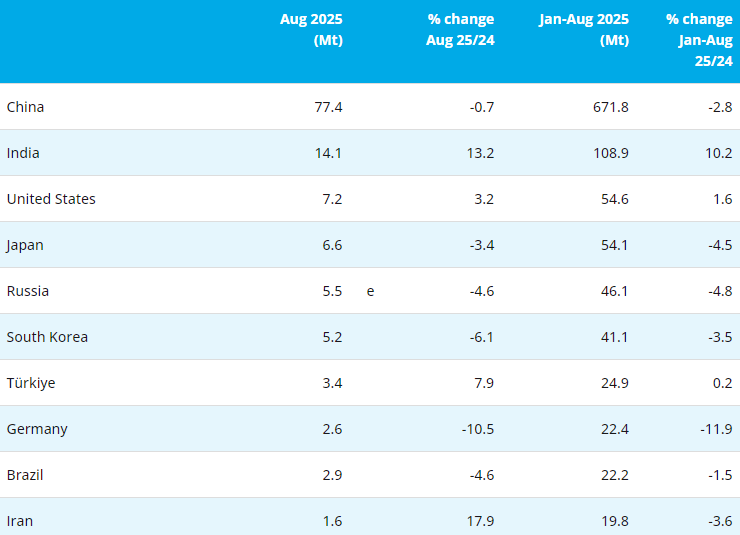Indonesia, the world’s largest tin exporter, wants to displace the London Metal Exchange as the venue for setting the global benchmark by requiring that the metal be traded on a local exchange before export. Prices rose.
“The purpose of trading physical tin through the bourse for export is to make Indonesia the place for international tin- price discovery, not to refer to theLME anymore,” Sutriono Edi, head of the Commodity Futures Trading Regulatory Agency, said by e-mail in response to Bloomberg questions. The government was studying other commodities to which the local-trade policy may be applied, he said, listing coffee, cocoa, rubber and coal.
Tin, used in smartphones and packaging, rallied to a six- month high in London in September after the rule took effect and smelters curbed exports, with only one exchange in Jakarta authorized to trade the ingots. The policy changes and lower shipments may create a bottleneck for the global market, spurring higher prices, according to Commerzbank AG. A decision allowing a second exchange to trade tin may come today, Edi said.
“Indonesia is not the only producer in the world,” Simon Collins, director and head of dry-bulk commodities at Trafigura Beheer BV, said from Geneva yesterday. “Until all the rules and regulations are fully clarified, and both the consumers and investors would be fully satisfied with the security around the exchange, I couldn’t see that happening,” Collins said when asked if Indonesian trading would draw volumes from the LME.
Miriam Heywood, a spokeswoman for the LME, declined to comment yesterday on Indonesia’s plans.
Global deficit
Tin for delivery in three months outperformed the five other main base metals including copper and nickel on the LME over the past year as the Indonesian curbs worsened a global deficit. The metal — which rallied to $23,500 on Sept. 30, the highest since March 19 — rose 0.4 percent to $22,850 at 2:41 p.m. in Jakarta, snapping a four-day losing run.
The rule change represents a challenge to the LME, the oldest and largest base-metals marketplace which was bought for $2.2 billion last year by Hong Kong Exchanges & Clearing. The origins of the LME’s three-month contract system are linked to the time copper and tin cargoes used to take to reach London from Chile and Malaya in the 19th century, according to its website. Indonesia, which accounts for 40 percent of global tin shipments, started trade under the new rule from Aug. 30.
“The solution is to have physical tin trading through the bourse, so that the tin-export price can be increased and Indonesia can be the world’s tin-price reference,” Edi wrote in the e-mail. Higher prices show the policy is working, he said.
Tin ingots
At present, only the Indonesia Commodity and Derivatives Exchange in Jakarta, or ICDX, is allowed to trade tin ingots before export from Southeast Asia’s largest economy. The regulatory agency, known as Coftra, has studied a proposal from the Jakarta Futures Exchange to also trade the metal, Edi said.
“We have submitted all the terms and documents,” M. Bihar Sakti Wibowo, a director at the JFX, said in an interview in Palembang, Sumatra on Oct. 2. “Exports will continue to be limited if only the ICDX trades tin. We’re trying to help increase shipments. There are 18 smelters ready to trade on the JFX and the volume from them is substantial.”
Tin futures and options traded on the LME last month gained 21 percent from a year earlier to 195,084 contracts, or 975,420 tons, according to bourse data. The ICDX traded 1,040 tons from Aug. 30 to Oct. 2, exchange figures tracked by Bloomberg show.
Lower exports
Timah, which declared force majeure after the rule change and wants to sell through the ICDX, estimated that Indonesia’s exports dropped to 3,000 tons last month, according to President Director Sukrisno. That would be the lowest since November 2011, according to data tracked by Bloomberg.
The new policy is designed to establish a domestically determined benchmark price, Trade Minister Gita Wirjawan said on Sept. 23. While the rule applies to refined tin ingots at present, it will be extended to cover other products such as solder from 2015.
Stockpiles in LME-registered warehouses contracted 13 percent in September, the biggest monthly decline since January 2012. The LME-tracked reserves dropped 25 tons to 13,170 tons yesterday, the lowest level since January.
The “trading regulation is causing a serious bottleneck,” said Peter Kettle, research manager at St. Albans, England-based ITRI, which is mostly funded by producers and smelters. “The rise in world prices does not offset the big fall in volumes, so there is less cash coming into the economy.”
The global deficit is forecast to more than double from 6,000 tons this year to 13,000 tons in 2015, according to Standard Bank Group Ltd. Citigroup last month raised its 2014 forecast 9.1 percent to $22,375 a ton.
Indonesia’s rule changes are aimed at tightening trade flows and raising prices, Credit Suisse Group AG said in a report yesterday. Many buyers have yet to register with local exchanges, and Timah had little choice in declaring force majeure, Credit Suisse said.
Copyright © 2013 Ferro-Alloys.Com. All Rights Reserved. Without permission, any unit and individual shall not copy or reprint!
- [Editor:editor]



 Save
Save Print
Print Daily News
Daily News Research
Research Magazine
Magazine Company Database
Company Database Customized Database
Customized Database Conferences
Conferences Advertisement
Advertisement Trade
Trade















Tell Us What You Think